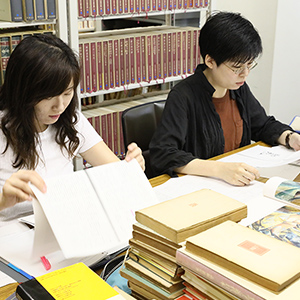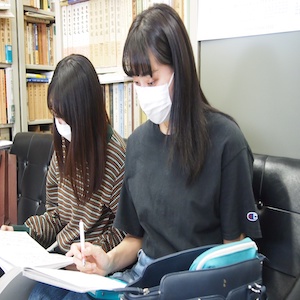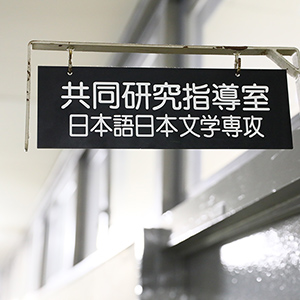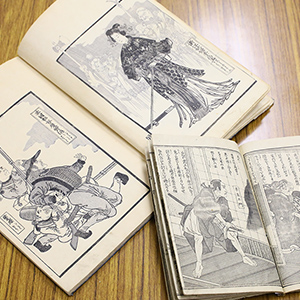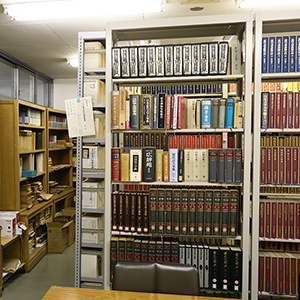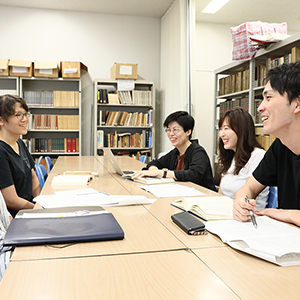Features of Japanese Language and Literature Major
Japanese language offers seminars and special lecturers on ancient Japanese, modern Japanese, and contemporary Japanese.
Japanese literature is broadly divided into classical literature and modern literature. In classical literature, seminars and special lectures are held for the middle ancient periods, medieval periods, and early modern periods, as well as from the Heian to Edo periods. In modern literature, four faculty staff members are in charge of seminars and special lectures in both prose and poetry from Meiji up to contemporary literature.
Modern literature also offers special lectures on comparative literature.
Curriculum
Master's Program
Please click on the tab of the field you want to view.
- Japanese Language
- Japanese Literature
- Intensive Course
| Subjects | Number of Credits |
|---|---|
| Special Lecture in Japanese Language I a | 2 credits |
| Special Lecture in Japanese Language I b | 2 credits |
| Special Lecture in Japanese Language I c | 2 credits |
| Special Lecture in Japanese Language I d | 2 credits |
| Graduate Seminar in Japanese Language I | 4 or 8 credits |
| Special Lecture in Japanese Language II a | 2 credits |
| Special Lecture in Japanese Language II b | 2 credits |
| Special Lecture in Japanese Language II c | 2 credits |
| Special Lecture in Japanese Language II d | 2 credits |
| Graduate Seminar in Japanese Language II | 4 or 8 credits |
| Special Lecture in Japanese Language III a | 2 credits |
| Special Lecture in Japanese Language III b | 2 credits |
| Special Lecture in Japanese Language III c | 2 credits |
| Special Lecture in Japanese Language III d | 2 credits |
| Graduate Seminar in Japanese Language III | 4 or 8 credits |
| Japanese Linguistic Research I a | 2 credits |
| Japanese Linguistic Research I b | 2 credits |
| Japanese Linguistic Research I c | 2 credits |
| Japanese Linguistic Research I d | 2 credits |
| Japanese Linguistic Research II a | 2 credits |
| Japanese Linguistic Research II b | 2 credits |
| Japanese Linguistic Research II c | 2 credits |
| Japanese Linguistic Research II d | 2 credits |
| Subjects | Number of Credits |
|---|---|
| Special Lecture in Japanese Literature I a | 2 credits |
| Special Lecture in Japanese Literature I b | 2 credits |
| Special Lecture in Japanese Literature I c | 2 credits |
| Special Lecture in Japanese Literature I d | 2 credits |
| Graduate Seminar in Japanese Literature I | 4 or 8 credits |
| Special Lecture in Japanese Literature II a | 2 credits |
| Special Lecture in Japanese Literature II b | 2 credits |
| Special Lecture in Japanese Literature II c | 2 credits |
| Special Lecture in Japanese Literature II d | 2 credits |
| Graduate Seminar in Japanese Literature II | 4 or 8 credits |
| Special Lecture in Japanese Literature III a | 2 credits |
| Special Lecture in Japanese Literature III b | 2 credits |
| Special Lecture in Japanese Literature III c | 2 credits |
| Special Lecture in Japanese Literature III d | 2 credits |
| Graduate Seminar in Japanese Literature III | 4 or 8 credits |
| Special Lecture in Japanese Literature IV a | 2 credits |
| Special Lecture in Japanese Literature IV b | 2 credits |
| Special Lecture in Japanese Literature IV c | 2 credits |
| Special Lecture in Japanese Literature IV d | 2 credits |
| Graduate Seminar in Japanese Literature IV | 4 or 8 credits |
| Special Lecture in Japanese Literature V a | 2 credits |
| Special Lecture in Japanese Literature Ⅴ b | 2 credits |
| Special Lecture in Japanese Literature Ⅴ c | 2 credits |
| Special Lecture in Japanese Literature Ⅴ d | 2 credits |
| Graduate Seminar in Japanese Literature V | 4 or 8 credits |
| Special Lecture in Japanese Literature IV a | 2 credits |
| Special Lecture in Japanese Literature IV b | 2 credits |
| Special Lecture in Japanese Literature IV c | 2 credits |
| Special Lecture in Japanese Literature IV d | 2 credits |
| Graduate Seminar in Japanese Literature IV | 4 or 8 credits |
| Special Lecture in Japanese Literature VII a | 2 credits |
| Special Lecture in Japanese Literature VII b | 2 credits |
| Special Lecture in Japanese Literature VII c | 2 credits |
| Special Lecture in Japanese Literature VII d | 2 credits |
| Graduate Seminar in Japanese Literature VII | 4 or 8 credits |
| Japanese Literary Researches I a | 2 credits |
| Japanese Literary Researches I b | 2 credits |
| Japanese Literary Researches I c | 2 credits |
| Japanese Literary Researches I d | 2 credits |
| Japanese Literary Researches II a | 2 credits |
| Japanese Literary Researches II b | 2 credits |
| Japanese Literary Researches II c | 2 credits |
| Japanese Literary Researches II d | 2 credits |
| Japanese Literary Researches III a | 2 credits |
| Japanese Literary Researches III b | 2 credits |
| Japanese Literary Researches III c | 2 credits |
| Japanese Literary Researches III d | 2 credits |
| Japanese Literary Researches IV a | 2 credits |
| Japanese Literary Researches IV b | 2 credits |
| Japanese Literary Researches IV c | 2 credits |
| Japanese Literary Researches IV d | 2 credits |
| Subjects | Number of Credits |
|---|---|
| Intensive Course I a | 2 credits |
| Intensive Course I b | 2 credits |
| Intensive Course I c | 2 credits |
| Intensive Course I d | 2 credits |
| Intensive Course II a | 2 credits |
| Intensive Course II b | 2 credits |
| Intensive Course II c | 2 credits |
| Intensive Course II d | 2 credits |
| Intensive Course III a | 2 credits |
| Intensive Course III b | 2 credits |
| Intensive Course III c | 2 credits |
| Intensive Course III d | 2 credits |
Doctoral Program
| Tutorial Academic Subjects | Number of Credits |
|---|---|
| A Specific theme study of Japanese Linguistics I | 4 or 12 credits |
| A Specific theme study of Japanese Linguistics II | 4 or 12 credits |
| A Specific theme lecture of Japanese Linguistics I | 4 credits |
| A Specific theme lecture of Japanese Linguistics II | 4 credits |
| A Specific theme study of Japanese Literature I | 4 or 12 credits |
| A Specific theme study of Japanese Literature II | 4 or 12 credits |
| A Specific theme lecture of Japanese Literature I | 4 credits |
| A Specific theme lecture of Japanese Literature II | 4 credits |
Process of Acquiring a Master’s Degree or PhD
Master's Program
Requirements for Applying for a Master’s Degree
- Period of Enrollment
You must be enrolled in the master’s program for more than 2 years. - Credit Requirements
A total of 32 credits or more must be obtained for a predetermined subject.
Process to Apply for a Degree
-
Framework of Research Guidance
Students will receive guidance on setting a research theme and creating a research plan in their field of specialization from their supervisor determined at the time of enrollment. Graduate students will conduct a series of research activities, and acquire professional competence through presentations of research results at research groups and conferences. -
First year
April: Attend orientation. Begin narrowing down research topics.
September: Present the concept or outline of the thesis at the graduate student research presentation conference, receive evaluations and advice from the supervisor and other faculty staff and graduate students, identify problems, and discuss solutions.
March: Submit results to the supervisor during the year and revise plans as necessary. -
Second year
From April to September: Continuously make interim reports at presentation conference and other events to learn about the research process.
October: Submit the master's thesis title.
October: Receive approval from the vice-chief supervisor at the regular committee meeting.
January: Submit the master's thesis.
February: Take the final oral examination for master's thesis.
March: Present master's thesis at the graduate student research presentation conference (master's thesis presentation).
During this period, it is desirable for students to publish the results of their research through research groups, conferences, journals, etc.
Doctoral Program
Requirements for Applying for a PhD
- Period of Enrollment
Those who have been enrolled in the doctoral program for more than 3 years, have earned the required credits, and have received the necessary research guidance.
Process to Apply for a Degree
-
Framework of Research Guidance
Students will receive guidance on setting a research theme and creating a research plan in their field of specialization from their supervisor determined at the time of enrollment. Graduate students will conduct a series of research activities, present the results at research groups and conferences, and submit papers to specialized journals for rigorous peer review in order to acquire the ability to carry out independent research activities. -
First year
April: Attend orientation. Begin narrowing down research topics.
From April to September: Formulate the concept of the doctoral thesis and discuss the plan with the supervisor.
September (or March): Students present the concept or outline of their thesis at the graduate student research presentation conference, receive evaluation and advice from their supervisor and other faculty staff and graduate students, identify problems and discuss solutions.
March: Submit results to the supervisor during the year and revise plans as necessary. -
Second year
From April to September: Begin writing the thesis in earnest based on the results of the first year.
September (or March): The results of this stage of research are presented at the graduate student research presentation conference. Review the progress of the research and have in-depth discussions with the supervisor. -
Third year
From April to September: Submit a interim draft of the thesis to the supervisor.
September: Present the research based on the interim drafts at the graduate student research presentation conference and receive evaluations.
October: Prepare a thesis based on the results of the research to date. With the approval of the supervisor, submit the thesis and request a dissertation review.
January: Take the final examination (e.g., public hearings) of the thesis for doctoral degree application.
During this period, it is desirable for students to publish the results of the research through research groups, conferences, journals, etc. as needed from year to year.
See other majors
- History Master's Program and Doctoral Program
- English Language and Literature Master's Program and Doctoral Program
- German Language and Literature Master's Program and Doctoral Program
- French Language and Literature Master's Program and Doctoral Program
- Socio-Cultural Studies Master’s Program
- Education and Clinical Psychology Master's Program and Doctoral Program

